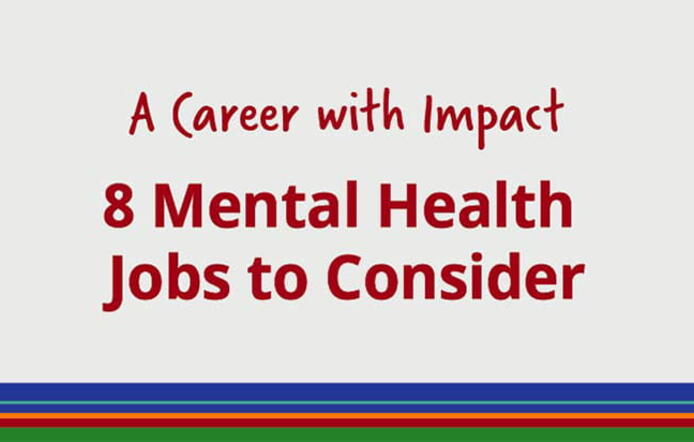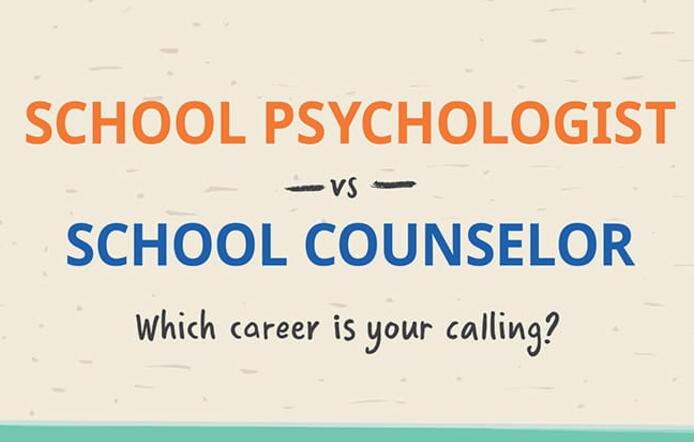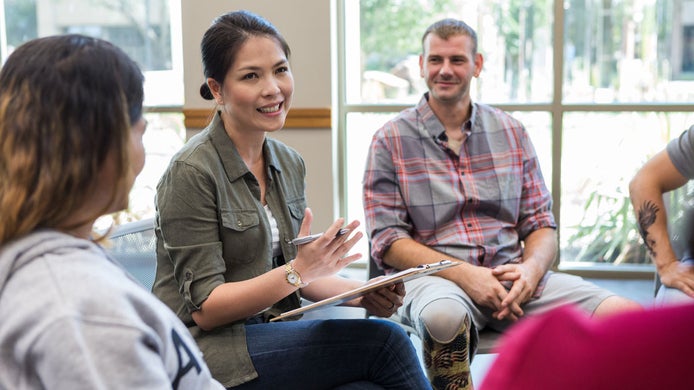From nationally available online degrees to clinical counseling aligned with California state standards, we have options if you’d like to make a career out of helping others.
Turn Your Passion Into a Profession
If you're inspired to support others, a helping profession like school counseling, marriage and family therapy, or behavioral health might be just the path for you. UMass Global offers accredited bachelor's and master's programs to help you make an impact in your community by combining your passion and skills with top quality education.
Many are available nationally and fully online with multiple emphasis options, while select degrees such as professional clinical counseling and credentials are aligned with California state industry standards. Professional development courses are also available for those currently working in the field and looking to add new specialties. Explore these helpful resources to determine which helping profession best aligns with your interests and goals, then start your journey to achieving them at UMass Global.

Who Do You Want to Serve?
As you begin to map out your professional path, consider what population you'd like to support:
- Children and adolescents
- Couples and families
- Incarcerated individuals
- Current or recovering addicts
- People with health conditions
Once you determine your niche, you can focus on career paths and find the degree program that can get you there.

Should I Major in Psychology?
It's important to reflect on your own interests and skills when determining if a bachelor's in psychology is right for you. Consider if you possess any of these common traits shared by many successful psychologists:
- Empathy
- Problem solving
- Lifelong learning
- Patience
- Open-mindedness


How to Become a Marriage and Family Therapist: 4 Steps to a Rewarding Career
While everyone’s path looks different, there are some concrete steps you'll have to follow. Here’s an overview of the typical marriage and family therapist requirements:
- Start with a bachelor's degree
- Earn a graduate degree
- Take the state licensing exam
- Decide where you want to work

What's the Difference Between a School Counselor and a School Psychologist?
While both school psychologists and school counselors focus their work on the mental health, emotional well-being, and academic achievement of students, there are some distinctions between the two. We put together this infographic to help you sort out the variances as you decide the best way for you to make an impact.

WASC Senior College and University Commission
University of Massachusetts Global is accredited by the WASC Senior College and University Commission (WSCUC)

California Commission on Teaching Credentialing
University of Massachusetts Global's School of Education is accredited by the California Commission on Teaching Credentialing (CTC)
Association for Advancing Quality in Educator Preparation
University of Massachusetts Global is a member in good standing of the Association for Advancing Quality in Educator Preparation (AAQEP), a national accrediting organization recognized by the Council for Higher Education Accreditation
Frequently Asked Questions
General
There are two aspects to in-person practice involved when a person wants to become a marriage and family therapist. First, there is the practicum requirement, which is part of the master’s degree curriculum. At UMass Global, MFT students must complete 400 hours of hands-on experience in their six practicum courses. Of these 400 hours, 300 will be spent in direct client contact and the remaining 100 hours are spent in supervision of others providing therapy. The direct client contact hours require 100 hours spent with couples and family client units. The remaining 200 hours may be individual or relational hours.
Once you earn your MFT degree, prior to sitting for your licensing exam, you now need to accumulate a certain amount of supervised clinical experience. For most states, (including California) this number is 3,000 hours. This takes two years in most cases. In these sessions, you work with clients while receiving supervision from a licensed therapist.
An emphasis in I/O psychology at the bachelor’s degree enhances job prospects in today's competitive market for several compelling reasons. I/O psychology provides individuals with knowledge, skills, and abilities that organizations value, including workplace dynamics, employee assessment, organizational development, and evidence-based management practices that generic business or psychology degrees don't cover. This specialized expertise is increasingly sought after as organizations recognize that their competitive advantage often lies in optimizing how they treat their employees.
In addition, I/O psychologists have practical skills that can be applied and directly transferred to workplace challenges. This includes designing valid selection systems, creating effective training programs, conducting meaningful performance evaluations, aligning career goals of individuals with the organization, and implementing organizational change initiatives. Employers value employees who can immediately apply these skills to solve real business problems.
With a bachelor's degree in psychology with an emphasis in I/O psychology, here are a few examples of jobs you can obtain with an emphasis in I/O:
- Human Resources Specialist
- Compensation and Benefits
- Training Specialist
- Job Recruiter
- Market Research Analyst
- Research and Data Analyst
- Public Relations Specialist
To become a practicing I/O psychologist, you’ll need a master’s degree in I/O psychology. Many people who are I/O psychologists hold a doctoral degree (Ph.D. or Psy.D.) in psychology with an IO specialization. The investment in advanced education typically yields substantial returns through expanded career options, higher compensation, and greater professional autonomy in addressing complex workplace challenges.
In psychology, your options are varied. You could stay within the field, pursuing a career in research, teaching, or become a practicing psychologist. Outside the field, a psychology degree translates well into a wide assortment of career roles in the private and public sectors. Understanding human behavior is valuable in just about any field. A psychology degree, coupled with a teaching credential (earned after your degree), could also allow a person to teach psychology at the high school level.
In counseling, a master’s degree is sufficient to become a practicing counselor or marriage and family therapist. After earning your degree, you must also pass your licensing exam. A master’s degree will also enable you to become a school counselor or school psychologist.
At UMass Global, we can help you pursue four options: becoming a counselor or a marriage and family therapist, or becoming a school counselor or school psychologist.
With their Master of Arts degree (and passage of subsequent licensing exam) marriage and family therapists and professional clinical counselors can treat patients in private practice settings and work for private, public, or nonprofit organizations. It is more common for Ph.D. students to lean into research or teaching at the college level, while the Psy.D. is more for practicing psychologists.
Both professions serve individuals dealing with mental health and situationally driven emotional challenges. The significant difference between the two professions can be found within the educational requirements.
- Counselors can serve clients after completing a master’s degree. This assumes that they are registered with the state governing body postgraduation.
- Psychologists can serve clients after completing a doctoral degree. As with counselors, this assumes that they are registered with the state governing body postgraduation.
Both professions serve individuals dealing with mental health and situationally driven emotional challenges. The significant difference between the two professions can be found within the educational requirements.
- Counselors can serve clients after completing a master’s degree. This assumes that they are registered with the state governing body postgraduation.
- Psychologists can serve clients after completing a doctoral degree. As with counselors, this assumes that they are registered with the state governing body postgraduation.
Child Psychology
Child psychologists focus on 3 key areas: physical, cognitive, and emotional development. These professionals teach children important coping skills for managing their emotions while helping them progress through each new stage. Essential skills and procedures for this job includes assessment, intervention, prevention program development, and research design. Find out more.
Child psychology helps serve the population who need support and guidance the most — our young people. ADHD, anxiety, and behavior disorders are among the most common disorders that can be diagnosed during childhood, but not all children, or parents, have the resources to address them. See the stats and more.
A master’s degree is expected of child psychologists. However, most employers look for those with a doctoral degree, which can also include an internship and supervised field experience. All psychologists in clinical practice must earn licensure, pass an industry examination, and pursue continuing education units. See more requirements.
While a bachelor’s degree alone does not qualify someone to become a licensed child psychologist, it provides a strong foundation for careers that involve working with children in various settings. Graduates may find opportunities in education, social services, childcare, youth programming, or nonprofit organizations.
Here are a few:
- Childcare provider — You could use this degree to work in daycare centers, preschools, foster care agencies, or as a nanny. To work in preschools, you would likely need to obtain additional certification.
- Child life specialist — Although not a clinical position, there are some hospitals and other medical facilities that focus on children’s health that hire individuals to help children cope with ongoing medical procedures.
- Youth counselor — Here, the term “counselor” does not mean to that you can provide psychological counseling, It refers to working with youth, typically adolescents, in areas such as after-school programs, camps, and other programs.
- Social services assistant — With this level of education, you would be working in “assistant” roles. For instance, in the social work arena, you could be a case worker assistant focusing on supporting children and families. You could also be employed as a case manager assisting families and children in navigating social services and resources.
- Healthcare assistant — As with social services, in the healthcare arena, you could look for positions such as rehabilitation assistant, helping therapists who work with children recovering from injuries or managing disabilities. Depending on the state in which you live, you could also serve as a mental health technician supporting licensed professionals in hospitals, residential treatment centers, or psychiatric facilities.
In this UMass Global degree program, students take a strong general core of required classes. Child Psychology is one of five concentrations, which includes 12 credits (four courses) that is taken along with the core requirements to get a bachelor’s degree in psychology with a concentration in child psychology.
While the UMass Global BA in Child Psychology won’t allow you to counsel or clinically treat children upon completion of the degree (depending on the goal, that would require at least a master’s degree and either a teaching credential or other licensing), it will provide a substantial framework of knowledge on which to build next steps in higher education and a future career.
Marriage and Family Therapy
Marriage and family therapy is a holistic approach to healthcare that emphasizes the long-term well-being of people and those within their support systems. Professionals can diagnose a wide range of mental disorders and provide treatment in one-on-one or group settings while focusing on the relationships that influence behavior. Read more.
Of course, the most common career for a person with a Master of Arts in Marriage and Family Therapy is to become a therapist. That role is discussed on the program page above.
But an MFT degree can open doors to a variety of career options beyond being a marriage and family therapist. Here are a few different options:
- School counselor — Counselors work with students on classroom behavior, academic performance, and other areas such as anxiety. They can also provide career guidance. The span of the role can vary depending on the size of the school and the school district.
- Residential counselor — Residential counselors provide counseling to adult residents with mental health issues within healthcare facilities or community-based institutions.
- Case manager — Case managers are the facilitators between patients and health care providers, coordinating mental, physical, or emotional support and healthcare for patients. Assessing patient needs is an important component of this job.
- Health educator — The role of a health educator is to help clients understand how to live healthier, happier lives. Health educators may work on their own or they can work within school systems, healthcare facilities, or rehabilitation facilities. In government positions, health educators can create educational campaigns intended to boost public health.
- Clinical director — This role is a supervisory one tasked with leading a particular department in settings such as hospitals. In smaller facilities, clinical directors may coordinate and manage the entire facility.
As a licensed marriage and family therapist (LMFT), you can help couples and families identify the conflicts and issues affecting their relationships and then develop strategies to enable them to work through and overcome those problems.
A Master of Arts in Marriage and Family Therapy (MFT) is the graduate degree required before a person can move on to earn licensure and become an LMFT. Prior to earning an MFT degree, the student would first need to earn a bachelor’s degree. Two logical choices that would suit a future career in marriage and family therapy would be a Bachelor of Arts in Psychology or a Bachelor of Arts in Social Work.
The most common path into the field is earning an MA in Psychology then completing two years of post-degree supervised clinical experience. All states require MFTs to be licensed, which generally involves passing the Marriage and Family Therapy National Exam and completing continuing education courses throughout their career.
The path is not set in stone, but becoming a marriage and family therapist typically involves these four steps:
- Education — Most states require a master’s degree in marriage and family therapy. But there is some leeway here, as some programs in mental health fields that focus on family therapy may also satisfy the educational component.
- Supervised clinical experience — After earning a master’s degree, a person must complete a specified number of supervised clinical hours working with clients. These hours, typically under the supervision of a licensed therapist, are in addition to the practicum hours earned with the master’s degree.
- Licensing exam — To demonstrate knowledge appropriate for a marriage and family therapist, states require you to pass a state-administered licensing exam. This exam covers topics such as assessment, diagnosing, systemic therapy, and hypothesizing. For instance, the California MFT Clinical Exam involves 150 questions and has a four-hour time limit. These exams are not uniform across every state.
- Continuing education — Once a person has gained licensure, most states require continuing education to stay up to date with the latest treatment/therapy approaches. To maintain your license as a marriage and family therapist, you must provide verification of completion of your required continuing education.
Mental Health Therapy
A mental health therapist is a human services professional who helps people cope with mental and emotional challenges. This career path allows you to work with clients facing issues like depression, anxiety, phobias, stress, self-esteem issues, grief, or relationship problems. Read on to learn more.
The primary duty of mental health therapists is to provide a safe, non-judgmental space for clients. They do this by collecting information through interviews, observations, or tests. This can include diagnosing disorders, crafting service plans, coordinating treatment with other health care professionals, and performing crisis interventions as needed. More info.
Some professionals in this sector work with specific populations — such as the elderly, children, or college students — while others serve a more encompassing role. Example workplaces include mental health clinics, schools, government organizations, social service agencies, employee assistance programs, and correctional or juvenile detention facilities. Full List
The two most common fields of study are psychology and social work. You'll need a master's degree in a mental health-related field such as an MFT. Licensure can require 2,000 to 4,000 hours of supervised clinical experience, along with continuing education courses and specified exams. More info
Substance abuse counselors can be instrumental in helping those experiencing addiction. Their work is greatly needed and rewarding. They guide clients in changing their attitudes and behaviors by adapting to new life practices and utilizing important coping skills through therapeutic care, education, and support. Explore more reasons.
The minimum requirement for a substance abuse counselor is a bachelor’s degree, but often a master’s in social work, psychology, or a similar field is expected. Licensure is a prerequisite for opening a private practice, and some states may require you to pass a state-issued exam. Explore more job requirements.
School Psychology and Counseling
Although they work directly with students daily, they also advocate at the individual and system level to ensure all children have equal access to education. In addition, they counsel and advise teachers, staff, and parents on how to support students with mental, emotional, and behavioral disorders. Find out more.
School psychology focuses on helping students succeed academically, socially, behaviorally, and emotionally. Professionals in this field also support students with disabilities by identifying and addressing their unique needs and collaborating with others who assist in providing services. Learn more.
School psychologists need strong skills in assessment, communication, and problem-solving. They interpret data, deliver evidence-based interventions, and collaborate with teachers, families, and administrators to support students’ academic, social-emotional, and behavioral growth. Key strengths include counseling, cultural competency, organization, and ethical decision-making.
Most school psychologists work full-time in K–12 public schools; others may be employed in private schools, community health organizations, and universities.
Like other mental health professions, school psychologists must earn an advanced degree to practice. In California, candidates must also complete a state-approved School Psychology credential program and hold a California Pupil Personnel Services (PPS) School Psychology credential. Once these prerequisites are met, candidates may apply for state licensure. Additionally, school psychologists can earn the Nationally Certified School Psychologist (NCSP) credential through the National Association of School Psychologists (NASP), which demonstrates mastery of national standards and enhances professional recognition. Learn more.
A school psychologist typically works with individual students and their families while a counselor tends to work with the larger school population. School psychologists, for example, may assess students for special education services, while a counselor tackles matters such as crisis intervention and preparing students for their overall future success. Find out more.
The UMass Global psychology undergraduate program offers a Bachelor of Arts (BA) degree. A BA in Psychology provides a broad-based education, offering a wider perspective on the field of psychology. At UMass Global, the electives available within the general psychology concentration reflect this versatility, covering diverse topics such as “Issues in Aging,” “Family Systems and Dynamics,” “Child Development,” and “Survey of Forensic Psychology.” This breadth of coursework allows students to explore multiple areas of psychology and apply their knowledge across various fields and careers.
Bachelor of science degrees in psychology typically are more research-oriented, with lab-based courses targeted toward graduate study in psychology.
To become a school counselor, like many mental health professions, you typically need to earn a master’s degree in counseling or educational counseling and complete supervised fieldwork in K–12 school settings, along with meeting your state’s licensure or credential requirements. At UMass Global, the MA in Educational Counseling with the embedded Pupil Personnel Services Credential in School Counseling combines online coursework with 100 hours of in-person supervised fieldwork plus 800 internship hours, preparing you to qualify for licensure as a school counselor in California K–12 schools.










